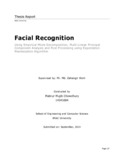Facial recognition using empirical mode decomposition, Multi-linear principal component analysis and post-processing using expectation maximization algorithm

View/Open
Date
9/1/2014Publisher
BRAC UniversityAuthor
Chowdhury, Mabrur MujibMetadata
Show full item recordAbstract
The field of facial recognition is rapidly growing into a vital part of our everyday lives. The use
of facial recognition systems has been extended primarily from security purposes to social
networking sites, managing fraud, and improved user experience. Numerous algorithms have
been designed to perform facial recognition with greatest accuracy. The use of several
preprocessing and post-processing techniques is also known to improve the effectiveness of these
recognition algorithms. This paper focuses on a three-tier approach towards facial recognition.
A widely popular recognition algorithm used today is the Principal Component Analysis (PCA).
Throughout the years, there have been many improvements and extensions to the original PCA.
One such extension is the Multi-linear PCA, which is the algorithm I have used in my study.
Studies have shown that results of the recognition algorithm can be greatly improved by applying
preprocessing techniques to the images before feeding them into the main recognition algorithm.
Therefore, in addition to the Multi-linear PCA, I will be using Empirical Mode Decomposition
(EMD) for preprocessing. Furthermore, I plan to run an Expectation Maximization (EM)
algorithm which estimates Maximum Likelihood values for information which may be missing
from the dataset.
Applying these three strategies simultaneously would allow us to have a more efficient, secure
and robust facial recognition system.
